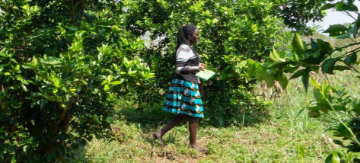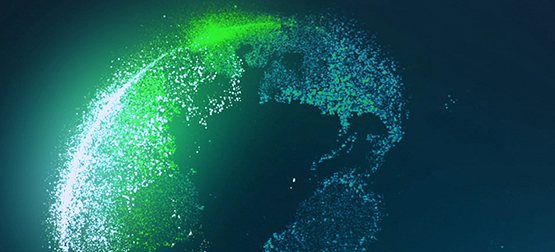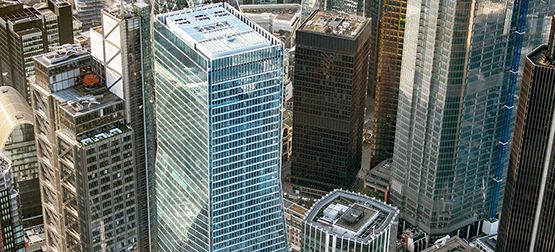Sign up to our quarterly sustainability newsletter
Freshfields' commitment to sustainability
Making strides towards a greener future
After a summer of chaotic weather, business action on sustainability is more vital than ever.
Freshfields is no exception. It was back in 2021, in fact, that the firm unveiled a set of ambitious environmental goals, among which was the phase out of single-use plastics across all of its offices. Making progress on plastics has not been easy. Here we report some of our incredible progress to date.
Catering is a good place to start. Most offices have now successfully eradicated single-use plastics from their catering operations, with those still in transition exploring reusable alternatives and swapping plastics for eco-friendly options. This collective endeavour has led to an impressive 72% reduction in single-use plastic items procured for catering operations compared to FY 2021/22, the previous reporting year. This means less plastic food containers, cutlery, plates and cups flowing through our catering operations every day.
Much of this success can be attributed to the efforts of the firm’s Global Green Group, who have sought alternatives to plastics not just in catering operations but across the firm's procurement spectrum. Importantly, the firm’s commitment extends beyond numbers to fostering a cultural shift in waste behaviours. London, for example, sends zero waste to landfill, supported by messaging about the value of reducing, reusing and recycling, as well as specific green office guidance.
In a show of solidarity, Freshfields championed Plastic Free July, a global initiative established in 2011 to encourage people to minimise their consumption of single-use plastics throughout the month of July. The firm's involvement raised awareness about the environmental hazards posed by plastics and the importance of responsible waste management practices both within and outside the office.
The true heroes of our sustainability journey are the people and teams from Amsterdam to Hong Kong who are helping to replace old patterns of behaviour with modern, green alternatives.
Amsterdam and the Plastic Whale: taking the lead on waste
Freshfields' Amsterdam office has emerged as a beacon of good practice through a unique partnership with a local charity, Plastic Whale Foundation. This partnership not only tackles plastic waste but also engages colleagues and the local community.
The Plastic Whale Foundation transforms plastic litter from the city's canals into practical items like foam boards, office furniture and even lamps. All remaining waste is separated into the correct waste streams and enters the recycling lifecycle. With around 50,000 PET bottles fished from Amsterdam’s canal network annually, as well as large amounts of other waste, the Plastic Whale Foundation’s efforts have a significant positive impact on the city. The project's fleet of fishing boats, constructed from fished plastic, symbolises a circular approach to waste management.
Freshfields fully embraced this initiative by sponsoring a boat for the next three years, offering colleagues the chance to participate in canal clean-up events and collaborate with clients for a meaningful cause.
In addition, the Amsterdam office has installed a new selection of recycling bins, consisting of four separate waste streams for food, plastics, cans and residual waste. Each waste stream is tracked with the aim of encouraging the office to maintain its high level of waste management and, in turn, reduce waste from being unnecessarily incinerated (which itself releases carbon emissions).
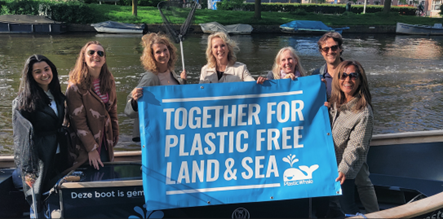
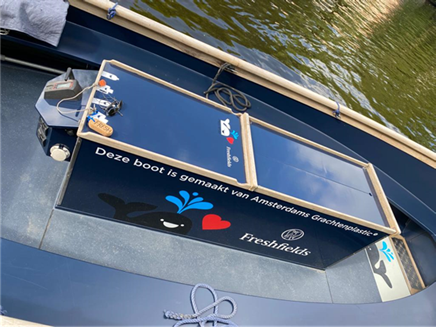
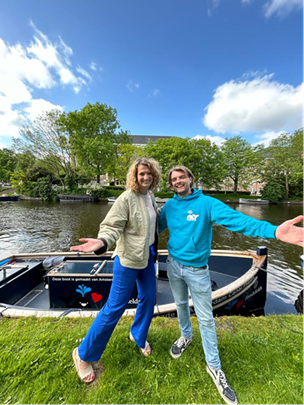
Hong Kong: the Spare-It challenge
Across the seas in Hong Kong, Freshfields' commitment to sustainability takes on a tech-savvy twist. The Hong Kong office embarked on the Spare-It Smart Waste Reduction Challenge, a corporate initiative that leverages technology to monitor and enhance waste diversion and recycling efforts.
As the number of general waste bins in the office has been reduced, an increased number of collection boxes for recyclables and compostable waste have been made available, making it easier than ever for colleagues to avoid landfill. This initiative not only reduces the firm's environmental footprint but also sets an example for other occupants of the building taking part in the challenge, creating a positive competitive edge.
By shunning personal rubbish bins in favour of strategically placed points for recycling and compost collection, the office has embraced its competitive spirit and achieved an impressive 49% diversion rate of waste from landfill.
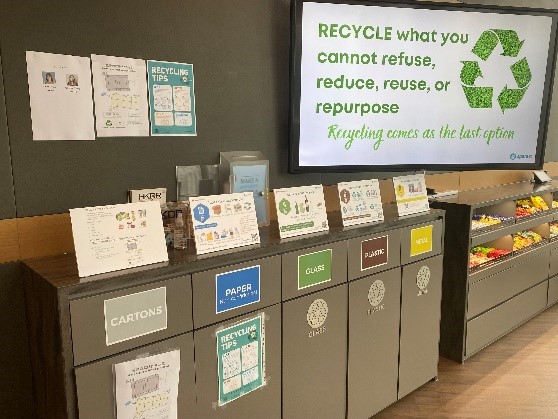
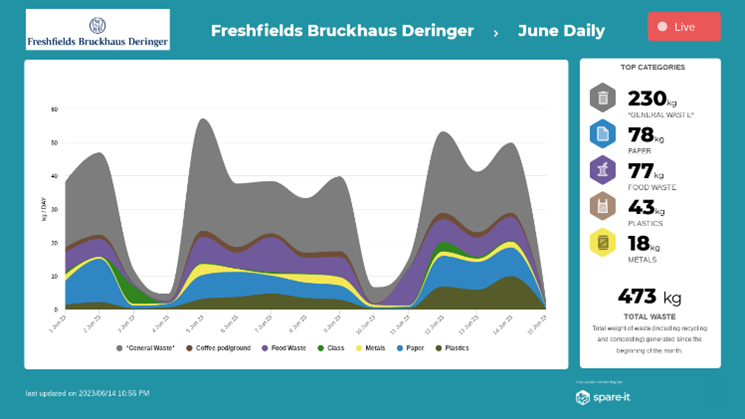
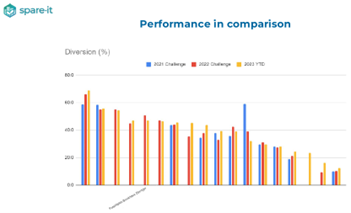
From Silicon Valley to Tokyo: a global effort
All three of our US offices (in Silicon Valley, Washington and New York) have said farewell to plastic cutlery in favour of personal portable cutlery, which has become a symbol of waste reduction. Similarly, following our Tokyo office’s move to 100% renewable energy in April 2023, a number of important changes have been introduced, from prioritising reusable cutlery to providing eco-bags and glass-bottled water. In Abu Dhabi, a simple yet effective shift from plastic to refillable glass bottles has significantly reduced plastic waste, while colleagues are empowered by monthly reports to drive waste reduction further.
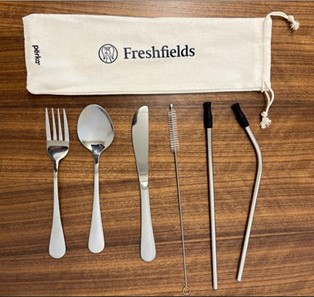
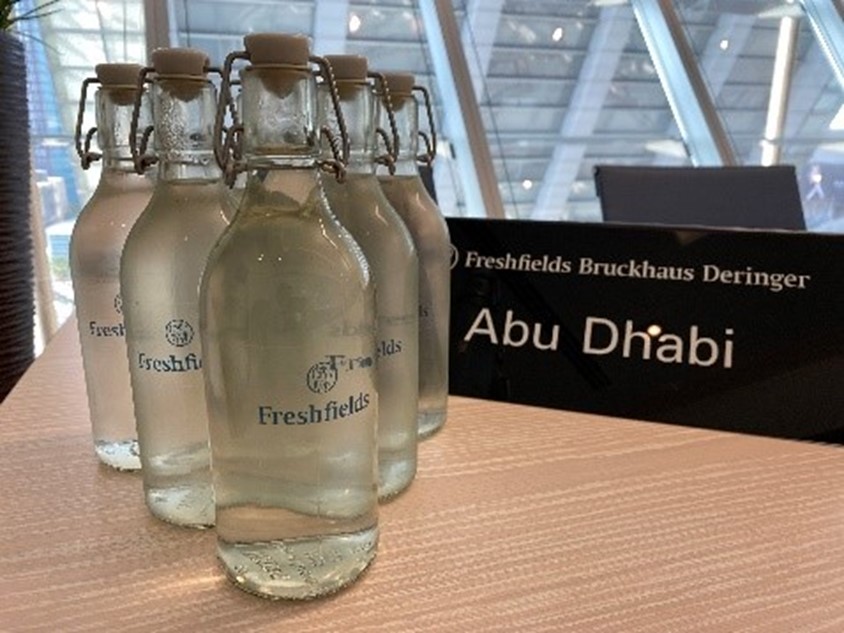
In our Manchester office, we recently took a dynamic turn as colleagues welcomed four interns from the firm's Aspiring Professionals Programme. This collective effort, driven by a shared vision of sustainability, resulted in an engaging and enlightening experience that left a lasting impact. The interns took the reins in an impactful lunch and learn session, focusing on Plastic Free July and the 'Sort it Out' waste challenge. They introduced the history and challenges of Plastic Free July, building awareness about plastic’s impact on the environment. Through engaging discussions, colleagues were encouraged to reconsider their use of plastic, how it is disposed of, and the consequences, culminating in a 'Sort it Out' waste challenge showcasing waste segregation analysis.
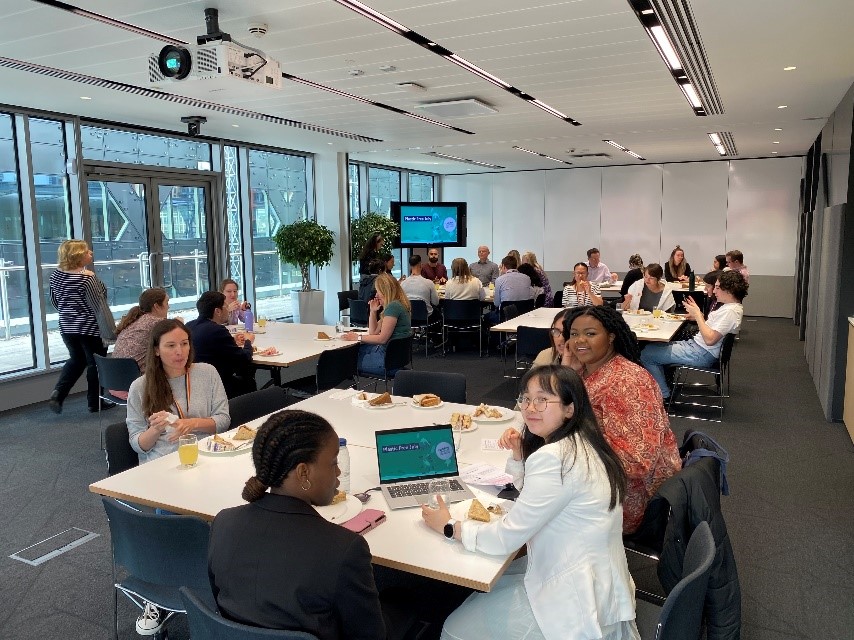
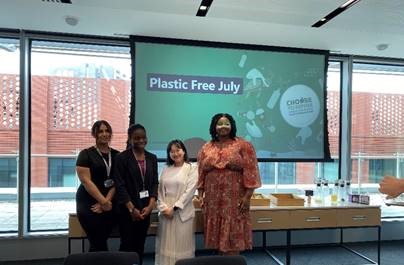
London: a city of change
Our London office, the largest in our global network, embraced Plastic Free July with communication campaigns and strategic operational changes, reducing single-use plastics in its catering operations to an all-time low through discounts for reusable cups and the removal of disposable containers. In tandem our London Environment Manager, Abigail Baker, conducted a plastic waste audit to gain insight into where plastic is originating, and options for eliminating it from procurement. Our London office has also entered the Clean City Awards Scheme which among other ambitions seeks to make London a Plastic Free City.
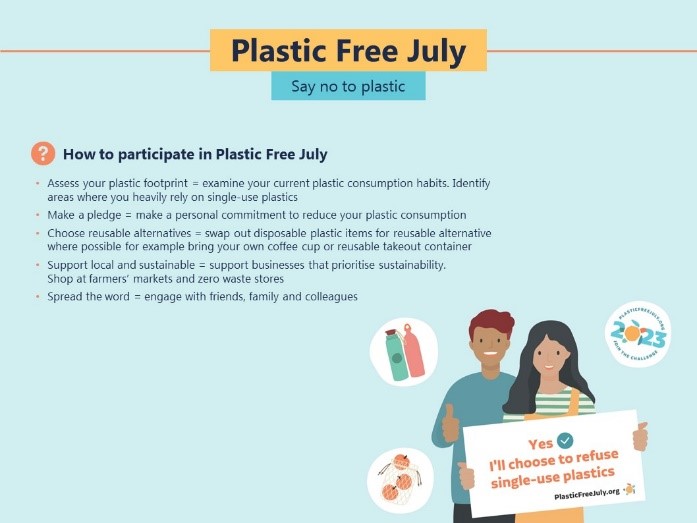
The firm extends a heartfelt thank you to all of the passionate colleagues across our offices who have been instrumental in driving down our use of plastics. Whilst we have not phased out plastics altogether, the lessons we are learning across the network are building the insights necessary to do so in future.
The firm’s environmental commitments are led by Dr Jake Reynolds, Head of Client Sustainability and Environment, supported by Global Environment Manager, Mikey Bloxham, the Global Green Group, with oversight from our Environmental Delivery Group (EDG).
